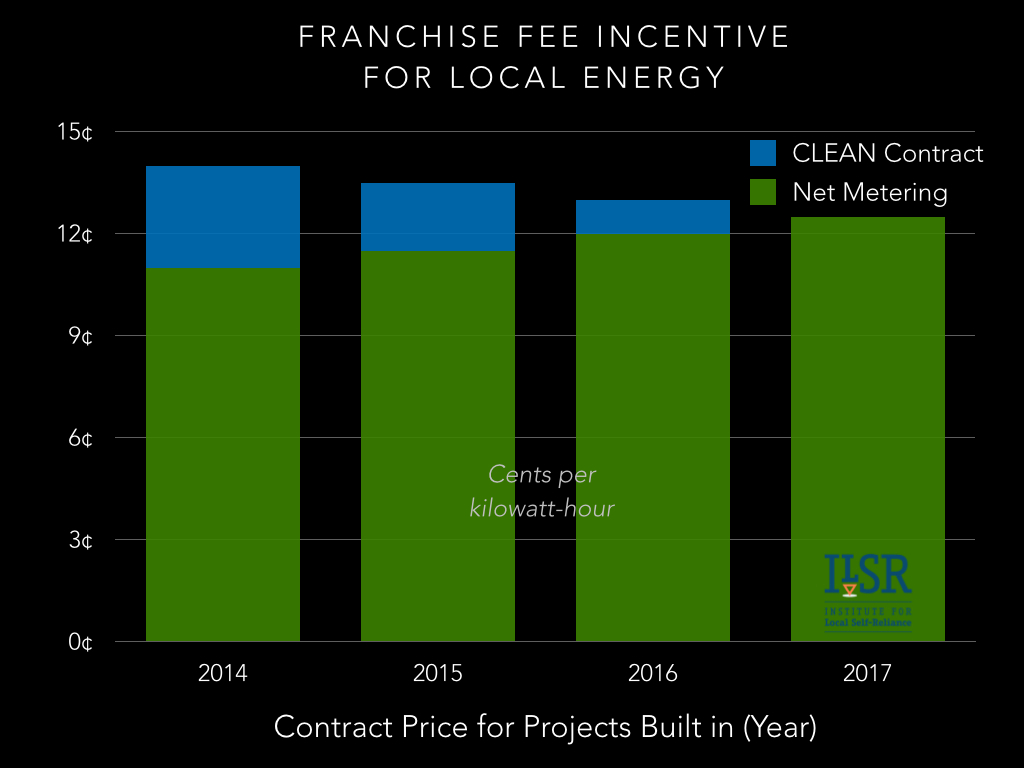A Rarely Tapped City Strategy for Boosting Local Renewable Energy
Support CleanTechnica's work through a Substack subscription or on Stripe.
Many cities served by private utilities think they have little capacity to encourage local renewable energy development. But a largely untapped tool – utility franchise contracts – may hold the key.
There are two kinds of city energy systems: publicly owned or privately owned. Cities with municipal utilities already have the power to implement the energy system that best fits their needs, and several such utilities have been leaders in energy efficiency and local renewable energy (see our City Power Play report). Cities with private utilities have felt relatively powerless, since these utilities are typically regulated by the state legislature or Public Utilities Commission.
But cities with private utilities may be overlooking a common legal tool governing the city-utility relationship, with a potential for revenue to support local energy development. These “franchise contracts” outline how a utility will use public property in order to deliver energy services. Think about the poles and wires running through a city neighborhood or gas pipelines running under streets, all of it public property and right-of-way.
Franchise contracts are typically renewed every 20 years, and are often renewed with little fanfare. But cities can use the expiration of utility franchises as an opportunity to discuss their energy future. Minneapolis, MN, for example, began a conversation about its energy future in early 2013 and prepared for the expiration of its city-utility contracts in 2014 by developing a detailed study of the “pathways” to a cleaner, more equitable, and more local energy future (scroll down for a brief slideshow of the study recommendations). The city is now prepared to create a novel city-utility partnership to meet its ambitious climate and sustainability goals
Franchise contracts can also be a source of revenue to support a clean, local energy economy. Many cities – several dozen served by Xcel Energy in Minnesota alone – already have a fee in place. Though not often done, this fee can be turned toward clean, local energy development.
For example, a local energy production incentive was explored in a policy paper developed by the Renewable Energy Task Force serving the city of Edmonton, using franchise fee revenue to supplement utility-provided compensation for renewable energy production. This “CLEAN Contract” would provide a long-term, production based incentive to complement revenue earned under net metering or similar policy. The following chart illustrates. The contracts signed in 2014, for example, provide a 3¢ per kilowatt-hour (kWh) bonus to net metering income, an amount that remains fixed for the duration of the (typically 20 year) contract. The contract price declines over time as the cost of energy from renewables continues to fall.
Franchise fee revenue could be used for a host of other tools to improve the capture of local energy dollars. Cities can motivate home- and business-owners to invest in energy efficiency by refunding energy audit fees to recipients who follow up on their audit by implementing energy efficiency measures. Franchise fee revenue could provide a loan loss reserve for an energy efficiency financing program like PACE, leveraging millions of dollars in private, low-risk loans for improving the energy use of local properties. Fee revenue could simply be invested in cutting energy costs of local government, whether through deep energy efficiency retrofits, street lighting upgrades, or on-site energy generation.
Many cities have aspirations to capture more of their local energy dollar for their economy, some are even motivated by larger environmental issues. Franchise contracts and franchise fees may provide cities with leverage and financial wherewithal to achieve a more local, equitable energy future.
[slideshare id=28499801&doc=minneapolisenergypathwaysstudypresentation-131121125312-phpapp02]
Photo credit: Powerhouse Museum
Sign up for CleanTechnica's Weekly Substack for Zach and Scott's in-depth analyses and high level summaries, sign up for our daily newsletter, and follow us on Google News!
Have a tip for CleanTechnica? Want to advertise? Want to suggest a guest for our CleanTech Talk podcast? Contact us here.
Sign up for our daily newsletter for 15 new cleantech stories a day. Or sign up for our weekly one on top stories of the week if daily is too frequent.
CleanTechnica uses affiliate links. See our policy here.
CleanTechnica's Comment Policy

